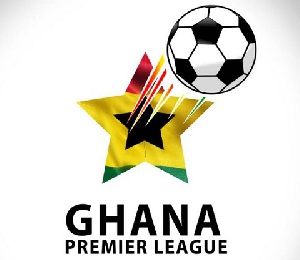Three weeks after the intended start date, the Ghana Premier League is all but set to take off this weekend.
Exciting! Refreshing! For alas, football is back…if only this sentiment was mutual between all stakeholders.
For the third consecutive year, the top flight could start without a headline sponsor.
With Ghana’s ‘big status’ in world football, with the ‘big names’ that have been produced, the nation’s flagship local competition should not go on without a lead sponsor. Or to put it bluntly – treading the path that ever so sharply irks the ‘football people’- the league should not be that bad as to not attract major sponsors.
However, that has been the dire narrative since First Capital Plus Bank – now Capital Bank – seceded its support in 2015 over restructuring reasons.
Ghana Premier League trophy presented to Ashanti Gold
The apoplexy is beyond regrettable.
Even so, the biggest worry is not the lack of headline sponsor; it’s unwillingness of unrepentant ‘football people’ to accept that the once powerful brand they sell no longer attracts, woos, nor seduces potential investors.
“This season is one of the most attractive league seasons I have ever witnessed in Ghana,” GFA president Kwesi Nyantakyi told Angel FM in 2016. “The competition and performance of clubs were at their peaks and until the last round of matches, [the relegated clubs were not fully known.
“The standard also rose so high, all due to interventions and courses undertaken by the FA, including marketing and event management courses. All these have helped in raising the standard very high.”
At first, it appears as though Nyantakyi was talking about a different league, not Ghana's!
But no! Mr. Prez was not lost on his case.
“The league is not as bad as some people want us to believe,” Nyantakyi told local sources earlier this month.
“It is one of the best organised and most competitive leagues in Africa. What we probably didn’t do well is raising sponsorship to support the running of clubs. It hasn’t been easy at all because cooperate organizations have their agenda, aims, etc.”
After the first set of quotes, there was a lingering uncertainty, but after the second, the wavering doubts formed a brazen conviction: Mr. President mistakes competitiveness for attractiveness.
Sadly, it is the clubs that are left to bear the brunt of such costly misjudgments.
In 2016, New Edubiase United were only just cajoled to complete the league, after the club, following several threats, pulled out, citing “difficulty in funding players and officials due to the FA’s failure to secure sponsorship for the league.”
“Some clubs have not paid their players for close to eight months, while others have not even paid the signing-on fees of their new players,” Edubiase president Abdul Salam Yakubu said to Nhyra FM.
Last season, newly-promoted Bolga All Stars became the first team to be relegated after a run of woeful results. The club, which has now been sold and rechristened Nkoranza Warriors, blamed financial struggles for their underwhelming campaign.
“If the club was allowed to play in the Upper East Region, we could be financially sound. The owner of the club nearly sold it to businessman from Techiman to run the club but negotiations were unfruitful,” club public relations officer Nelson Abanga said in his explanation of their struggles in an interview with Volta Star FM.
One can only imagine how many more clubs are caught up in similar predicaments.
The FA must face the real situation, raise its game, and put clubs out of their misery, rather than cursing media men for badmouthing a ‘sacrosanct’ product.
The lack of headline sponsor is only one part of the jigsaw puzzle as quality of play, infrastructure, among others, are nothing to write home about.
Help must come someway somehow…and now, but it must start by the FA accepting that if you struggle to sell, then you have something that no one wants to buy.
Sports Features of Tuesday, 27 February 2018
Source: goal.com
The financial blues of a frustrated Ghana Premier League
Entertainment












